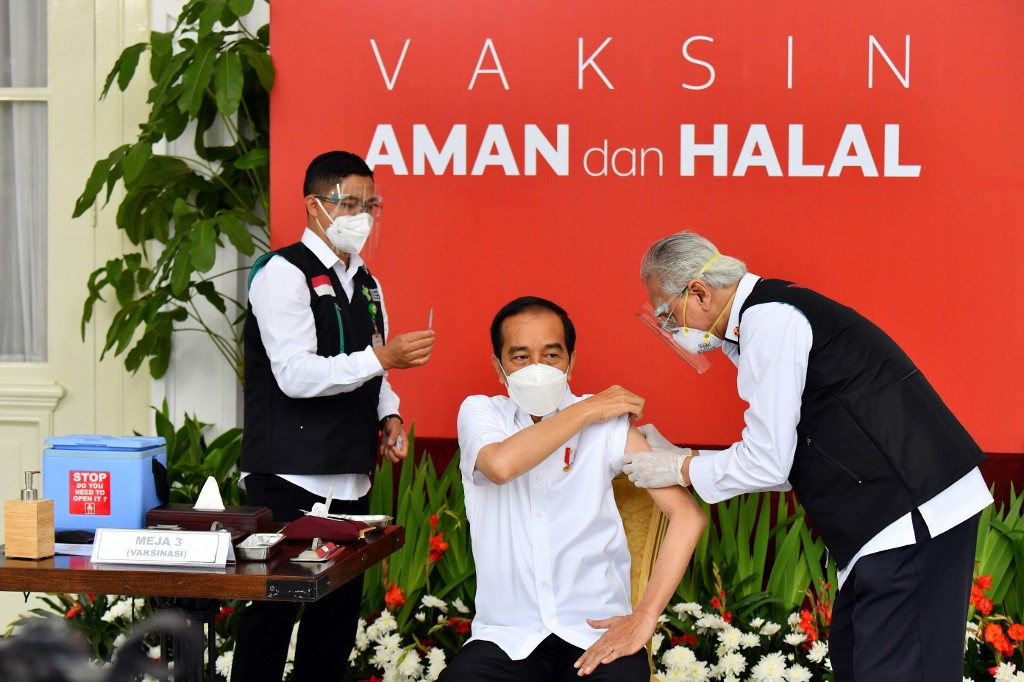Popular Reads
Top Results
Can't find what you're looking for?
View all search resultsPopular Reads
Top Results
Can't find what you're looking for?
View all search resultsAs vaccination begins, hospitalizations soar
Hopes high over vaccine helping to control runaway pandemic
Change text size
Gift Premium Articles
to Anyone
P
resident Joko “Jokowi” Widodo received on Wednesday the fi rst shot of a Chinese-made COVID-19 vaccine, marking the start of Indonesia’s vaccination campaign.
However, the country still faces a more dangerous and imminent threat: Its hospitals are getting full. The government’s hopes are high that the vaccine, which was approved for emergency use on Monday and aims to gradually reach some 181 million Indonesians, could help suppress the severity of COVID-19 symptoms and thus prevent a surge in hospitalizations.
Unfortunately, this problem is already a reality in many regions across the country, as incoming patients, including those who suffer from other diseases, face difficulties in securing even a regular hospital bed. With over 600 medical-worker deaths from the virus recorded, according to Lawan COVID-19 (Fight COVID-19) volunteers, calls have intensified for the government to fix the problem in front of it rather than solely relying on the time-consuming vaccine roll-out.
As of Wednesday, the nation logged a record-breaking 11,278 new daily confirmed cases and 306 deaths, although the scale of the crisis could be much bigger.
Irfan Pradana, a 27-year-old start-up worker, had to witness losing his ailing aunt to diabetes, after two hospitals in West Bandung regency, West Java, turned her away. She passed away in the emergency room of the third hospital visited on Jan. 8, waiting for a ward to free up.
Over the course of the outbreak, Irfan’s 56-year-old aunt was unable to get regular hospital check-ups because of the virus, Irfan said. He recalled her last moments, unconscious and struggling to breathe.
“The nurse repeatedly told my mother to hold my aunt’s hand because it kept falling to the side of the bed,” he told The Jakarta Post on Wednesday.
The first private hospital they went to turned her away, while the second one, a regional general hospital, was in the process of sterilization because many of its medical workers had tested positive for COVID-19. The third hospital only took her in after Irfan’s relatives practically begged the administrators, he said. She was tested for COVID-19, was given an IV drip and breathing assistance but died that day before they found a ward and her test results came back negative. The grief that Irfan felt for the loss of his uwa (aunt in Sundanese) had him fearing for his other family members.
“I’m mad because I know it’s a structural problem that doesn’t stem only from people not obeying health protocols. There have been so many blunders in the government’s COVID-19 response since the outset,” Irfan said on Wednesday. “Even hope has become a luxury.”
Doctors have expressed concern over delayed treatment for non-COVID-19 patients, some of whom were only able to go to a hospital once their condition became severe. In anticipation of a spike in infections, Health Minister Budi Gunadi Sadikin said he had instructed hospitals to allocate more beds for COVID-19 patients.
He asked hospitals that have reserved 10 percent of their beds for COVID-19 patients to temporarily increase the allocation to 30 to 40 percent.
“This is the fastest way to add wards; to anticipate tens of thousands of new patients. I’m asking for help from all hospital directors and owners to convert beds not originally allocated for COVID-19 patients into COVID-19 beds,” Budi said on Monday.
The minister has acknowledged that this was a problem the country would be facing at least until February.
Logging over 10,000 new daily cases has become the new norm in Indonesia, where active cases have reached more than 120,000 nationwide, more than double the figure in November. As of Tuesday, at least 11 provinces have seen their bed occupancy rates (BOR) exceed the ideal figure of 60 percent to guarantee prompt treatment.
Banten and Jakarta recorded a BOR of 82 percent and 80 percent, respectively, followed by Yogyakarta (78 percent), West Java (76 percent), East Java (72 percent) and Central Java (70 percent). Bali, Lampung and Central Sulawesi each recorded a BOR of 64 percent and East Kalimantan’s rate stood at 62 percent. Budi has acknowledged estimates of a spike in cases after the Christmas and New Year holidays since December, but mobility curbs were only reimposed across Java and Bali on Monday.
“The government is only about lip-service [...] I don’t think the Health Ministry was serious about adding more beds because, in the field, hospitals are still full,” LaporCOVID-19 cofounder Irma Hidayana said on Tuesday.
LaporCOVID-19 has been helping people seeking beds for COVID-19 treatment. It saw a surge in requests around the end of November, she said.
“Why is much of the focus on vaccines? The problem right now is that people are dying before they can even receive treatment,” she said.










